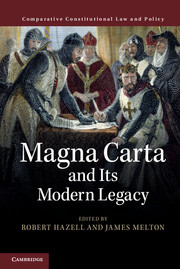Book contents
- Frontmatter
- Contents
- List of Contributors
- Preface
- INTRODUCTION
- PART I INFLUENCE IN THE UNITED KINGDOM
- PART 2 INFLUENCE AROUND THE WORLD
- PART 3 TWENTY-FIRST-CENTURY REFLECTIONS ON MAGNA CARTA
- 8 Magna Carta and Modern Myth-Making: Proportionality in the ‘Cruel and Unusual Punishments’ Clause
- 9 Judicial Supremacy: Explaining False Starts and Surprising Successes
- 10 More Magna Than Magna Carta: Magna Carta's Sister – the Charter of the Forest
- 11 Michael Oakeshott, the Legendary Past and Magna Carta
- Appendix English Translation of Magna Carta (1215)
- Bibliography
- Index
9 - Judicial Supremacy: Explaining False Starts and Surprising Successes
from PART 3 - TWENTY-FIRST-CENTURY REFLECTIONS ON MAGNA CARTA
Published online by Cambridge University Press: 05 June 2015
- Frontmatter
- Contents
- List of Contributors
- Preface
- INTRODUCTION
- PART I INFLUENCE IN THE UNITED KINGDOM
- PART 2 INFLUENCE AROUND THE WORLD
- PART 3 TWENTY-FIRST-CENTURY REFLECTIONS ON MAGNA CARTA
- 8 Magna Carta and Modern Myth-Making: Proportionality in the ‘Cruel and Unusual Punishments’ Clause
- 9 Judicial Supremacy: Explaining False Starts and Surprising Successes
- 10 More Magna Than Magna Carta: Magna Carta's Sister – the Charter of the Forest
- 11 Michael Oakeshott, the Legendary Past and Magna Carta
- Appendix English Translation of Magna Carta (1215)
- Bibliography
- Index
Summary
In many of the world's democracies, the judicial branch is supreme. Judicial review allows it to have the final say over the laws of the land, as well as decisions made by the other branches of government. In other words, the judiciary, alone, resolves controversies about the legitimacy and scope of legislation or executive action. Usually what this means is that a higher court exercises the authority to nullify legislative and executive actions on the basis of the constitution.
In the United States in particular, a supreme, federal court accomplishes this task by strategically selecting case law that bears constitutionally on other cases and legislative statutes. The upshot is that it frequently restrains the other branches, if not rebukes them. The seminal Marbury v. Madison [1803] decision inspired a series of subsequent decisions in which the court either struck down or affirmed national and state laws, even though they could not punish executives if they were to ignore their judgments. The Supreme Court's 2012 decision in National Federation of Independent Business v. Sebelius, which declared the Affordable Care Act constitutional, is perhaps the most notable recent example.
This is a very puzzling development. The judicial branch lacks any obvious way in which it can enforce its decisions; it lacks a militia or any other organised coercive force that can sanction the other government branches if they disobey its decisions. Moreover, the judicial branch lacks the power of the purse – it is at the mercy of the legislative branch for financial support. And furthermore, in the U.S. system and several other democracies characterised by judicial supremacy, judges are appointed by executives and vetted by legislatures. Even though unelected justices have the final say over the constitutionality – and thus legitimacy – of a country's laws in these contexts, they seem, in the most basic sense, beholden to the other branches of government.
- Type
- Chapter
- Information
- Magna Carta and its Modern Legacy , pp. 169 - 193Publisher: Cambridge University PressPrint publication year: 2015
- 1
- Cited by



